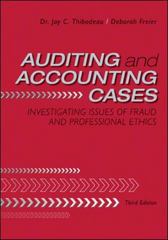Within Andersen there was a group of expert accountants tasked with reviewing and passing judgment on difficult
Question:
Within Andersen there was a group of expert accountants tasked with reviewing and passing judgment on difficult accounting, auditing, and tax issues; this group was called the professional standards group (PSG). The PSG had objected strongly to several accounting issues related to the Enron audit. However, based on memos that were later uncovered, the PSG’s objections had been overruled by the lead Andersen partner on the Enron audit, David Duncan. In addition, Duncan allegedly helped carry out Enron’s request to have one of the PSG partners barred from advising on any issues related to the Enron audit.4 In 1999 Enron’s chief financial officer, Andrew Fastow, spoke to David Duncan about Enron’s plan to set up a special purpose entity (later called LJM), a financing vehicle used to access capital or increase leverage without adding debt to a firm’s balance sheet. After the discussion with Fastow, Duncan asked for the advice of the PSG.
A member of the PSG, Benjamin Neuhausen, represented the group’s disapproval in an e-mail message written to Duncan on May 28, 1999: “Setting aside the accounting, (the) idea of a venture equity managed by CFO is terrible from a business point of view. . . . Conflicts of interest galore. Why would any director in his or her right mind ever approve such a scheme?” he wrote. In addition, the PSG was firmly against the idea of Enron’s recording gains on the sales of assets (or immediate gains on any transactions) to the Fastow controlled special purpose entity. In response to the recording of gains, Duncan wrote in a June e-mail message, “I’m not saying I’m in love with this either. . . . But I’ll need all the ammo I can get to take that issue on . . . on your point 1, (i.e. the whole thing is a bad idea), I really couldn’t agree more.” Yet Duncan later told Fastow that Andersen would sign off on the transaction under a few conditions, one of which was that Fastow obtain the approval of Enron’s chief executive and its board of directors.6 Shortly after, Carl Bass, a member of the PSG since December 1999, raised concerns over the sale of some equity options within the LJM special purpose entity. Bass wrote to his boss John Stewart via e-mail, “This is a big item and the team apparently does not want to go back to the client on this. I think at a minimum the Practice Director needs to be made aware of this history and our opposition to the accounting.”7 However, the memo Duncan’s team prepared to document the deal indicated that Bass “concurred with our conclusions.”8 Bass continued to object to the LJM transaction, writing in an e-mail message to Stewart (Bass’s boss) in February 2000, “This whole deal looks like there is no substance. The only money at risk here is $1.8 million in a bankrupt proof special purpose entity (SPE). All of the money here appears to be provided by Enron.” Duncan’s team did not address Bass’s concerns and, in fact, continued to misrepresent his views to the client.
In late 2000 Duncan asked Bass for more advice on how best to account for four Enron SPEs known as Raptors. Enron wanted to lump together the financial results for all the entities so that the more profitable ones could offset losses being garnered by others. Bass opposed the idea. Nevertheless, Duncan later decided that Andersen would “accept the client’s position,” with some modifications.10 In February 2001 Andersen held a routine annual risk assessment meeting to determine whether to keep Enron as a client. Some partners raised concerns related to how much debt Enron was not putting on its balance sheet, Fastow’s conflict of interest, and the lack of disclosure in the company’s financial footnotes.11 Duncan reassured his fellow partners.
Carl Bass was removed from the Enron account in March 2001. Bass wrote to Stewart (Bass’s boss) in an e-mail message, “Apparently, part of the process issue stems from the client (Enron) knowing all that goes on within our walls on our discussions with respect to their issues. . . . We should not be communicating with the client that so and.......
Case Questions
1. Explain why an accounting and auditing research function (like Andersen’s PSG) is important in the operations of a CPA firm. What role does the function play in completing the audit?
2. Do you believe that the engagement leader of an audit (like David Duncan on the Enron audit) should have the authority to overrule the opinions and recommendations of the accounting and auditing research function (like the PSG)? Why or why not?
3. After Carl Bass was removed from the Enron account, he indicated to his boss that he did not believe Enron should have known about internal discussions regarding accounting and auditing issues. Do you agree with Bass’s position? Why or why not?
4. Do you believe that this provision of the law goes far enough? That is, do you believe the audit firm itself (and not just the partner) should have to rotate off an audit engagement every five years? Why or why not?
Step by Step Answer:

Auditing And Accounting Cases Investigating Issues Of Fraud And Professional Ethics
ISBN: 9780078110818
3rd Edition
Authors: Jay Thibodeau, Deborah Freier





